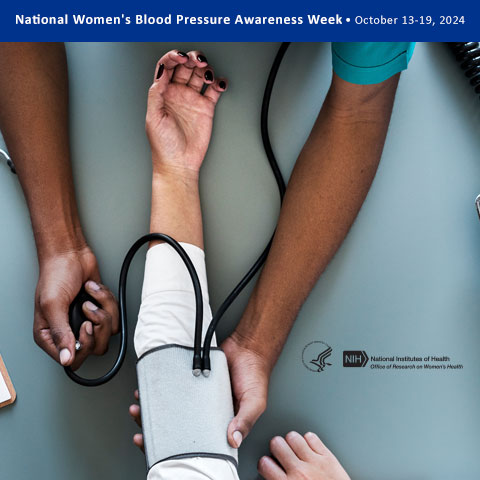
Nearly 60 million women in the United States, or 46%, have high blood pressure, including 1 in 5 women of reproductive age. Despite these staggering figures, high blood pressure is often underdiagnosed in women. Additionally, many women who have or are at risk for developing high blood pressure aren’t aware of their blood pressure levels. The number one killer of women in the U.S. is heart disease, and high blood pressure is one of its key risk factors.
Throughout the week of October 13–19, the U.S. Department of Health and Human Services’ Office on Women’s Health (OWH) will be raising awareness about high blood pressure, also known as hypertension, to improve women’s health outcomes. Information provided during National Women’s Blood Pressure Awareness Week (NWBPAW) aims to help women understand and manage their heart health with suggested strategies and highlighted resources that can help prevent or control high blood pressure.
This year’s NWBPAW theme, “Empower Every Era: Blood Pressure Control Across the Lifespan,” emphasizes the importance of monitoring and controlling blood pressure across every stage of life, from young adulthood through menopause and beyond. The theme also focuses on heart health disparities, particularly for women in underserved and underrepresented communities.
Certain characteristics and conditions can put women at a higher risk for high blood pressure. Black women are more likely to experience high blood pressure than White, Asian, and Hispanic women, while women who had high blood pressure during pregnancy have a greater risk of developing high blood pressure later in life. Women with disabilities are also more likely to experience high blood pressure at some point in their lives compared with women without disabilities.
High blood pressure is common and can lead to serious health problems, such as aneurysms, kidney disease, heart attacks, and strokes. However, most women can control their high blood pressure through lifestyle changes, such as reducing salt intake, increasing physical activity, and managing stress in healthy ways.
Below are a variety of helpful OWH resources about blood pressure management:
- Blood Pressure Control in Early Adulthood
- Pregnancy and Postpartum Blood Pressure Considerations
- Menopause and Heart Health
- High Blood Pressure and Health Equity
- 5 Things to Know About Hypertension in Pregnancy
- NWBPAW 2024 Fact Sheet
- NWBPAW 2024 Toolkit
ORWH encourages women to monitor their blood pressure, understand their numbers, and take steps toward a healthier future during NWBPAW.
